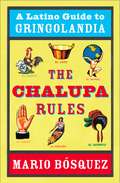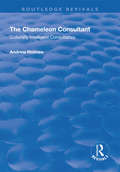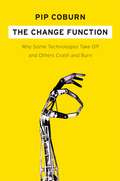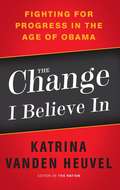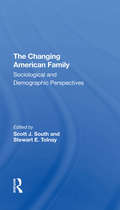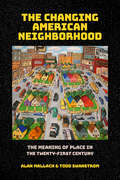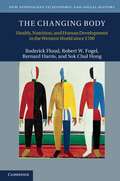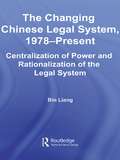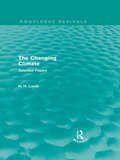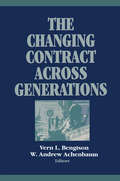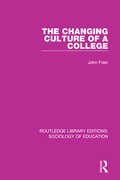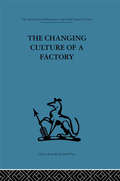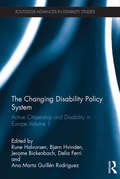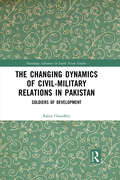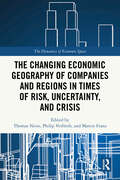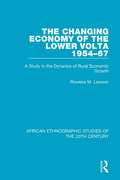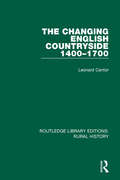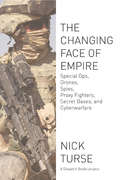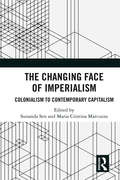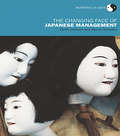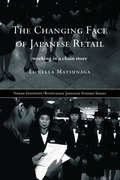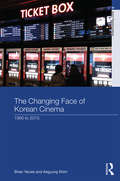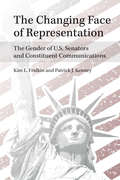- Table View
- List View
The Challenges of the US-Japan Military Arrangement: Competing Security Transitions in a Changing International Environment
by Anthony DiFilippoThis is an in-depth analysis of the U.S.-Japan security alliance and its implications for Japan and the Asia-Pacific region. It moves away from the official line that the alliance is a vital aspect of Japan's security policy and introduces issues and arguments that are often overlooked: American security policy has failed to achieve its goals; Japan's interests are not fully served by the alliance; the alliance itself is a source of instability in the region; and the arrangement has placed constraints on Japan's own political development. The author measures current developments in U.S. foreign policy against Japan's role in the region and Japan's own political development. He assesses the consequences of the alliance for the current regional situation in Northeast Asia, looks at future policy options for Japan, and makes the case for a neutralist security policy.
The Chalupa Rules: A Latino Guide to Gringolandia
by Mario BosquezThe Host of Martha Stewart's "Living Today" on Martha Stewart Living Radio (Sirius 112/XM 157)brings you this insightful look at how a colorful Mexican game of chance inspired him to succeed in life. "The Chalupa Rules" combines his family's timeless proverbs,traditional Spanish sayings, and powerful imagery to create a blueprint for success. Mario grew up facing tremendous challenges that included poverty and living in a government-sponsored home. With his handcrafted rules-of-life Mario went on to become the first full-time, Mexican-American news anchor in New York City's English television. An award-winning playwright and Emmy-Nominated news anchor/reporter, Mario shares his insights into how your own cultural background can provide the inspiration to reach the American Dream. Part autobiography, part instructional manual, The Chalupa Rules offers readers of diverse cultural backgrounds a universal message of success and fulfillment in the career of your choice. Mario Bosquez, nominated for a James Beard Award for Excellent in Broadcasting, lived the Chalupa Rules and shows us all how we can do the same.
The Chameleon Consultant: Culturally Intelligent Consultancy
by Andrew HolmesThis title was first published in 2002. How do you add value to your clients? Is it the process you use, or the technical skills you deploy? Or perhaps it's your ability to adjust the way you sell and deliver your services based upon your tacit understanding of your client's culture - the way we do things round here. Such chameleon-like behaviour is fundamental to successful consulting, and yet it is neither widely understood nor practised within the profession. Until now. This book describes a powerful way to improve the consultancy process, from selling the service to delivering the engagement, through a concept called cultural intelligence - the missing dimension of effective consultancy. By revisiting the consultancy process using a simple model of organizational culture, this text creates a potent technique for tailoring the principal consultancy processes of selling, relationship management, account management and engagement management. Such tailoring that ensures the consultant and consultancy firm can blend into their clients' organizations more effectively and as a result add immediate and lasting value.
The Change Function
by Pip CoburnThe ultimate guide to predicting winners and losers in high technology Pip Coburn became famous for writing some of the liveliest reports on Wall Street. He quoted everyone from Machiavelli to HAL, Anaïs Nin to Yoda, Einstein to Gandhi. But along with the quirky writing, he consistently delivered sharp insights into technology trends and helped investors pick stocks with long-term potential. After years of studying countless winners and losers, Coburn has come up with a simple idea that explains why some technologies become huge hits (iPods, DVD players, Netflix), but others never reach more than a tiny audience (Segways, video phones, tablet PCs). He says that people are only willing to change when the pain of their current situation outweighs the perceived pain of trying something new. In other words, technology demands a change in habits, and that's the leading cause of failure for countless cool inventions. Too many tech companies believe in "build it and they will come"-- build something better and people will beat a path to your door. But, as Coburn shows, most potential users are afraid of new technologies, and they need a really great reason to change. The Change Function is an irreverent look at how this pattern plays out in countless sectors, from computers to cell phones to digital TV recorders. It will be an invaluable book for people who create and invest in new technologies.
The Change I Believe In: Fighting for Progress in the Age of Obama
by Katrina Vanden HeuvelOn the night of the 2008 presidential election,Nationeditor Katrina vanden Heuvel spoke for many: "For the first time in decades, electoral politics became a vehicle for raising expectations and spreading hope. ” But, she cautioned, "We progressives need to be as clear-eyed, tough, and pragmatic about Obama as he is about us. ” Where I Standcollects vanden Heuvel’s commentaries and columns from the first years of the Obama administration, an era that has come to be defined by reform and reaction. In the wake of the economic crisis and challenges from the insurgent Tea Party movement, it is clear that it will take more than one election (and one person) to reshape American politics and repair the damage wreaked by a decade of calamitous conservative rule. Vanden Heuvel challenges the limits of our downsized political debate, arguing that timid incrementalism and the forces of money and establishment power that debilitate American politics will be overcome only by independent organizing, strategic creativity, bold ideas, and determined idealism.
The Changing American Family: Sociological And Demographic Perspectives
by Scott J South Stewart TolnayIn this book, leading authorities on the family show how families, parents, and children have been affected by changing patterns of marriage and cohabitation. Taking a long historical perspective, some authors consider trends such as the decline of multigenerational families and group differences in the relationships between economic opportunity and the timing of marriage. But the focus is predominantly on questions of current interest: patterns of union formation, differences between marriage and cohabitation, contact between divorced fathers and their children, the division of household labor, and the transmission of attitudes and behavior across generations. Intended for scholars and advanced students, this book offers essential analysis of the changing dimensions of the American family.
The Changing American Neighborhood: The Meaning of Place in the Twenty-First Century
by Todd Swanstrom Alan MallachThe Changing American Neighborhood argues that the physical and social spaces created by neighborhoods matter more than ever for the health and well-being of twenty-first-century Americans and their communities. Taking a long historical view, this book explores the many dimensions of today's neighborhoods, the forms they take, the forces and factors influencing them, and the people and organizations trying to change them. Challenging conventional interpretations of neighborhoods and neighborhood change, Alan Mallach and Todd Swanstrom adopt a broad, inter-disciplinary perspective that shows how neighborhoods are messy, complex systems, in which change is driven by constant feedback loops that link social, economic and physical conditions, each within distinct spatial and political contexts. The Changing American Neighborhood seeks to understand neighborhoods and neighborhood change not only for their own importance, but for the insights they offer to help guide peoples' efforts sustaining good neighborhoods and rebuilding struggling ones.
The Changing Body
by Roderick Floud Robert W. Fogel Bernard Harris Sok Chul HongHumans have become much taller and heavier, and experience healthier and longer lives than ever before in human history. However it is only recently that historians, economists, human biologists and demographers have linked the changing size, shape and capability of the human body to economic and demographic change. This fascinating and groundbreaking book presents an accessible introduction to the field of anthropometric history, surveying the causes and consequences of changes in health and mortality, diet and the disease environment in Europe and the United States since 1700. It examines how we define and measure health and nutrition as well as key issues such as whether increased longevity contributes to greater productivity or, instead, imposes burdens on society through the higher costs of healthcare and pensions. The result is a major contribution to economic and social history with important implications for today's developing world and the health trends of the future.
The Changing Chinese Legal System, 1978-Present: Centralization of Power and Rationalization of the Legal System (East Asia: History, Politics, Sociology and Culture)
by Bin LiangThis groundbreaking book examines the changing Chinese legal system since 1978. In addition to historical analyses of changes at the economic, political-legal, and social levels, Liang gives special attention to crime and punishment functions of the legal system, and the current judicial system based on field research, i.e., court observations in both Beijing and Chengdu. The court system has been in a process of systemization, both internally and externally, seeking more power and relative independence. However, traditional influences, such as preference of mediation (over litigation) and substantive justice (over procedural justice), and lack of respect (from the masses) and guaranteed power (from the political structure), still have major impacts on the building and operation of the judicial system. Liang also shrewdly places the Chinese legal and political reform within the global system. This book, which reshapes our understanding of the economic, political, and essentially legal changes in China within the global context, will be crucial reading for scholars of Asia, law, criminal justice, and sociology.
The Changing Climate: Selected Papers (Routledge Revivals: A History of Climate Changes)
by H. H. LambFirst published in 1966 these collected papers, written by the distinguished and visionary climatologist Hubert H. Lamb, describe how climates come about and give a history of climatic changes from the last ice-age to the 1960s.
The Changing Contract across Generations (Social Institutions and Social Change Series)
by Vern L. Bengtson W. Andrew AchenbaumGenerational conflict has attracted considerable attention in the media and within academic circles during the past decade. At the center of this collection of papers analyzing various facets of that conflict lie complex issues of generational equity - issues that will remain important for the framing of public policy during the 1990s, What do the young and the middle-aged owe the elderly? In discharging that debt, to what extent are they able to provide for their own old age in a climate of changing notions of welfare? What light do the longer perspectives of history shed on these issues? What role do kinship, gender, and economic status play?The papers commissioned by Bengtson and Achenbaum are intended to give greater analytic rigor to current debates. The volume is interdisciplinary not only by theoretical intent but by the practical imperatives of gerontology. More than a dozen sociologists, economists, historians, demographers, and policy analysts discuss the meanings and ambiguities that are inherent in terms such as "generation," "equity," "compact," "contract," and "conflict," in order to assess how relations between the age groups seem to vary from one sociohistorical context to the next.This distinguished group of contributors raises comparative issues throughout, assessing variations in generational ties by gender, race, class, and geographic location. Several project the extent to which recent changes in the political economy, public philosophy, and demographic structure of most "modern" societies presage greater conflicts, or greater consensus, in family members' relationships and social ties.
The Changing Culture of a College (Routledge Library Editions: Sociology Of Education Ser.)
by John FrainAs a result of the Liverpool City Council's reorganization of its Further Education Service, the South Mersey College was established on September 1, 1986 through the amalgamation of the Riverside College of Technology and the Childwall Hall College of Further Education; two of the city's eight colleges of further education. This book provides a
The Changing Culture of a Factory
by Elliott JaquesTavistock Press was established as a co-operative venture between the Tavistock Institute and Routledge & Kegan Paul (RKP) in the 1950s to produce a series of major contributions across the social sciences. This volume is part of a 2001 reissue of a selection of those important works which have since gone out of print, or are difficult to locate. Published by Routledge, 112 volumes in total are being brought together under the name The International Behavioural and Social Sciences Library: Classics from the Tavistock Press. Reproduced here in facsimile, this volume was originally published in 1951 and is available individually. The collection is also available in a number of themed mini-sets of between 5 and 13 volumes, or as a complete collection.
The Changing Disability Policy System: Active Citizenship and Disability in Europe Volume 1 (Routledge Advances in Disability Studies)
by Jerome Bickenbach Delia Ferri Rune Halvorsen Bjørn Hvinden Ana Marta Guillén RodriguezBeing an ‘active citizen’ involves exercising social rights and duties, enjoying choice and autonomy, and participating in political decision-making processes which are of importance for one’s life. Amid the new challenges facing contemporary welfare states, debate over just how ‘active’ citizens can and ought to be has redoubled. Presenting research from the first major comparative and cross-national study of active citizenship and disability in Europe, this book analyses the consequences of ongoing changes in Europe – what opportunities do persons with disabilities have to exercise Active Citizenship? The Changing Disability Policy System: Active Citizenship and Disability in Europe Volume 1 approaches the conditions for Active Citizenship from a macro perspective in order to capture the impact of the overall disability policy system. This system takes diverse and changing forms in the nine European countries under study. Central to the analysis are issues of coherence and coordination between three subsystems of the disability policy system, and between levels of governance. This book identifies the implications and policy lessons of the findings for future disability policy in Europe and beyond. It will appeal to policymakers and policy officials, as well as to researchers and students of disability studies, comparative social policy, international disability law and qualitative research methods.
The Changing Dynamics of Civil Military Relations in Pakistan: Soldiers of Development (Routledge Advances in South Asian Studies #44)
by Rabia ChaudhryThe Changing Dynamics of Civil Military Relations in Pakistan offers a unique insiders’ perspective on the political climate in the country, presenting the challenges established in boundaries of interaction between the state and its military. This book argues that the prospects of another military coup in Pakistan are minimal because of the military extending its presence in the civil arenas and thus discovering new avenues of concretising its hegemony. Based on primary data sources in the form of interviews with senior military personnel, civil bureaucrats and other relevant technocrats and using military and government publications to verify their claims, the author discusses the military’s previous takeovers and future plans from a defense point of view. The book uncovers how the military has created a space and rationale for itself in non-defense sectors. Providing a first-hand account of why and how the military extends itself beyond proscribed fields of responsibility and their expected outcomes, the book also provides a theoretical context to the military’s hegemonic status using literature on civil military relations in general and Pakistan in particular. The book uses Pakistan as a case study to show how civil military imbalances in the world over can be re-evaluated. It will be of interest to researchers studying political science, public policy, peace and security studies, governance and institutions, law and South Asian Studies.
The Changing Economic Geography of Companies and Regions in Times of Risk, Uncertainty, and Crisis (The Dynamics of Economic Space)
by Martin Franz Thomas Neise Philip VerfürthThis book offers conceptual and empirical insights from economic geography to explore how uncertainties, crises, and risks, shape, reshape, and ultimately transform the spatial arrangements of companies and regions.This book provides valuable insights into the evolving landscape of economic interactions amidst contemporary challenges. It explores concepts such as global value chains, global production networks, regional resilience, and the impact of crises, risks, and uncertainties on spatial economic patterns. Case studies from various regions, nations, and industries, including lesser researched sectors such as medical technology and the restaurant and bar industry offer tangible and real-world manifestations of these dynamics. Through its comprehensive coverage and interdisciplinary approach, this book equips readers with practical knowledge applicable to academia and real-world contexts. It offers a deeper understanding of the complex interplay between economic geography and contemporary challenges at a variety of levels.The book provides valuable perspectives for academics, practitioners, and policy makers in the fields of Economic Geography, Regional Studies, Political Sciences, Economic Sociology, Economics, and International Business Studies.
The Changing Economy of the Lower Volta 1954-67: A Study in the Dynanics of Rural Economic Growth
by Rowena M. LawsonOriginally published in 1972 this study analyses the process of economic growth and social change in the riparian communities of the Lower Volta River in Ghana, which came about in large part due to the construction of the Volta dam in 1963. With its completion many of the riparian communities were denied the ecconomic advatages of natural irrigation and water flow for inland fisheries, although they did benefit through the emergence of a valuable lake fishery. The study cound that the socio-economic preconditions for a rise in the standard of living had been building up over some time and many social, economic and political forms of change had been introduced to change the previous static equlibrium. Such influences began to erode the hitherto unquestioned acceptance of traditional institutions and the stability and security they offered.
The Changing English Countryside, 1400-1700 (Routledge Library Editions: Rural History #1)
by Leonard CantorThe period covered by this book, first published in 1987, was an important one for the rural landscape in England. The author describes and analyses the evolution of the countryside during the years which witnessed the gradual disappearance of the medieval landscape and the introduction of new farming methods and industrial techniques, thus laying the foundation for the radical changes that were to transform the English countryside in the eighteenth and nineteenth centuries. The main features of the countryside are dealt with fully and examples are given of their remains which can still be identified in the landscape today.
The Changing Face of Early Modern Time, 1550–1770
by Jane DesboroughThis book provides a reinterpretation of early modern clock and watch dials on the basis of use. Between 1550 and the emergence of a standard format in 1770, dials represented combinations of calendrical, lunar and astronomical information using multiple concentric rings, subsidiary dials and apertures. Change was gradual, but significant. Over the course of eight chapters and with reference to thirty-five exceptional images, this book unlocks the meaning embedded within these early combinations. The true significance of dial change can only be fully understood by comparing dials with printed paper sources such as almanacs, diagrams and craft pamphlets. Clock and watch makers drew on traditional communication methods, utilised different formats to generate trust in their work, and tried to be help users in different contexts. The calendar, lunar and astronomical functions were useful as a memory prompt for astrology up until the mid-late seventeenth century. After the decline of this practice, the three functions continued to be useful for other purposes, but eventually declined.
The Changing Face of Empire
by Nick TurseFollowing the failures of the Iraq and Afghan wars, as well as "military lite" methods and counterinsurgency, the Pentagon is pioneering a new brand of global warfare predicated on special ops, drones, spy games, civilian soldiers, and cyberwarfare. It may sound like a safer, saner war-fighting. In reality, it will prove anything but, as Turse's pathbreaking reportage makes clear.
The Changing Face of Imperialism: Colonialism to Contemporary Capitalism
by Sunanda Sen Maria Cristina MarcuzzoThis volume reiterates the relevance of imperialism in the present, as a continuous arrangement, from the early years of empire-colonies to the prevailing pattern of expropriation across the globe. While imperialism as an arrangement of exploitation has sustained over ages, measures deployed to achieve the goals have gone through variations, depending on the network of the prevailing power structure. Providing a historical as well as a conceptual account of imperialism in its ‘classical’ context, this collection brings to the fore an underlying unity which runs across the diverse pattern of imperialist order over time. Dealing with theory, the past and the contemporary, the study concludes by delving into the current conjuncture in Latin America, the United States and Asia. The Changing Face of Imperialism will provide fresh ideas for future research into the shifting patterns of expropriation – spanning the early years of sea-borne plunder and the empire-colonies of nineteenth-century to contemporary capitalism, which is rooted in neoliberalism, globalization and free market ideology. With contributions from major experts in the field, this book will be a significant intervention. It will be of interest to scholars and researchers of economics, politics, sociology and history, especially those dealing with imperial history and colonialism.
The Changing Face of Japanese Management (Working in Asia)
by Keith Jackson Miyuki TomiokaFor many western managers the approach taken by successful Japanese organisations and their managers has tended to inspire awe, envy and incomprehension in equal measure. But what is so special about 'Japanese' management? And how 'special' is the response of Japanese managers to global business pressures ? This textbook addresses these questions. It presents case examples generated from interviews with Japanese managers in Japan, Europe and the USA, contextualising their comments by reference to recent research in the fields of international and intercultural management. The book explains how and why individual managers variously perceive threats or opportunities in the business and career environments currently evolving both inside and outside Japan. It combines vivid images of the expected and the exceptional, the traditional with the new and unfamiliar.The Changing Face of Japanese Management offers management students with little prior knowledge of Japanese business and society, critical insights into what is happening inside Japanese management today. It also offers clear and immediately transferable insights to management practitioners who are preparing to work or negotiate with Japanese business partners.
The Changing Face of Japanese Retail: Working in a Chain Store (Nissan Institute/Routledge Japanese Studies)
by Louella MatsunagaThis book examines employment structure, working practice and recruitment strategies in Japanese retail in the 1990s through a case-study of one large chain store. Issues focused on include gender in the workplace, changing notions of corporate community and the impact of Japan's recent recession. In particular the research presented here challenges the view of part-time female staff as peripheral to the workforce and asks whether a rethink of the Japanese employment system is now overdue.
The Changing Face of Korean Cinema: 1960 to 2015 (Asia's Transformations)
by Brian Yecies Aegyung ShimThe rapid development of Korean cinema during the decades of the 1960s and 2000s reveals a dynamic cinematic history which runs parallel to the nation’s political, social, economic and cultural transformation during these formative periods. This book examines the ways in which South Korean cinema has undergone a transformation from an antiquated local industry in the 1960s into a thriving international cinema in the 21st century. It investigates the circumstances that allowed these two eras to emerge as creative watersheds, and demonstrates the forces behind Korea’s positioning of itself as an important contributor to regional and global culture, and especially its interplay with Japan, Greater China, and the United States. Beginning with an explanation of the understudied operations of the film industry during its 1960s take-off, it then offers insight into the challenges that producers, directors, and policy makers faced in the 1970s and 1980s during the most volatile part of Park Chung-hee’s authoritarian rule and the subsequent Chun Doo-hwan military government. It moves on to explore the film industry’s professionalization in the 1990s and subsequent international expansion in the 2000s. In doing so, it explores the nexus and tensions between film policy, producing, directing, genre, and the internationalization of Korean cinema over half a century. By highlighting the recent transnational turn in national cinemas, this book underscores the impact of developments pioneered by Korean cinema on the transformation of ‘Planet Hallyuwood’. It will be of particular interest to students and scholars of Korean Studies and Film Studies.
The Changing Face of Representation: The Gender of U.S. Senators and Constituent Communications
by Kim Fridkin Patrick KenneyAs the number of women in the U.S. Senate grows, so does the number of citizens represented by women senators. At the same time, gender remains a key factor in senators' communications to constituents as well as in news media portrayals of senators. Focusing on 32 male and female senators during the 2006 congressional election year, Kim L. Fridkin and Patrick J. Kenney examine in detail senators' official websites, several thousand press releases and local news stories, and surveys of 18,000 citizens to discern constituents' attitudes about their senators. The authors conclude that gender role expectations and stereotypes do indeed constrain representational and campaign messages and influence news coverage of both candidates and elected senators. Further, while citizens appear to be less influenced by entrenched stereotypes, they pay more attention to female senators' messages and become more knowledgeable about them, in comparison to male senators.

